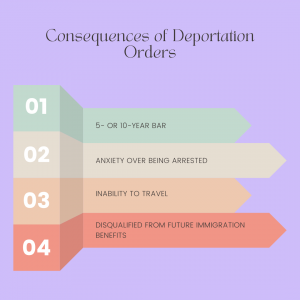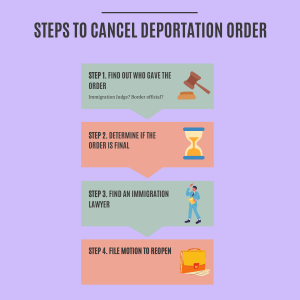How to Cancel a Deportation Order
If you were deported, you may wonder, “I have a deportation order — what can I do about it? Is it even possible to cancel a deportation order?”
In this article, we start by answering, “What is a deportation order?” Next, we discuss what happens when you have a deportation order, and why you should do something about it. Finally, we explain in detail how you can lift a deportation order.
What is a deportation order?
A deportation order is an official decision by the United States government to physically remove you to your country. You can get one in immigration court. You can also get an order of deportation by a border official if you were caught crossing illegally.
For more details, check out an overview of various types of deportation.
How do I know if I have a final deportation order
For now, it’s best to know the difference between an actual deportation order and something less official.
You have an actual deportation order in one of two situations:
- You were in removal proceedings, an immigration judge gave you a removal order, and you exhausted your appeals.
- An immigration judge granted you voluntary departure and you never left.
- You never showed up to your court hearing.
- You were caught near the border and given something called an “expedited order of removal.”
What does not qualify as a deportation order?
There are times when you are sent out of the United States, but it doesn’t qualify as a deportation order.
- When an immigration judge grants you a voluntary departure and you leave the U.S. on time.
- When an immigration official sends you back to your country without giving you a formal deportation. This is called a voluntary return.
What happens if I have a deportation order?
If you have a deportation order, you will face several consequences.
Consequences of a deportation order

First, if you’re living outside the United States, you may be barred from returning for some time. For example, if you got a deportation order in court, you will have to wait 10 years from when you left the U.S. If you got a deportation at the border, you’ll have to wait 5 years. Note: if you face a 5- or 10-year bar, there are still some options for fixing your papers.
Second, if are still in the United States, you may have to live in constant fear that ICE can you pick you up. People with deportation orders often try to live under the radar. They have to worry about hiding their names and addresses. This alone is a good reason to consider trying to cancel a deportation order.
Third, you cannot travel abroad to see relatives. Except in rare situations, if you leave the U.S., you won’t be able to come back.
Fourth, having a deportation order can make it impossible to qualify for new immigration benefits. Let’s take an example. Suppose you got a deportation order in immigration court. Ten years later, your U.S.-born child turns 21 years old. He or she wants to petition for your green card. Because of your deportation order, you will not be be eligible for one. Similarly, if you get married to a U.S. citizen, you still can’t get a green card until your deportation order is cancelled.
How Cancelling a Deportation Order Will Help You
There are several reasons to cancel a deportation order.
First, you will no longer have to live in fear of ICE arresting you.
Second, it will make it easier to apply for immigration benefits. For example, cancelling the deportation order could allow you to get a green card through a U.S. citizen spouse or child.
Third, it can speed up the process of fixing your papers. Deportation orders can often result in penalties of 5, 10, and even 20 years outside the United States. Canceling the order can make it possible to get your papers much faster.
How to Cancel a Deportation Order

There are several steps to follow to cancel a deportation order.
1. Learn what type of deportation order you have.
To cancel a deportation order, you first have to know what kind of order it is. The process for cancelling a deportation order depends on who gave the order.
Did an immigration court make the order? If so, you need to know which immigration court gave the order. For example, if you seek to reopen your case, then you can only file papers with immigration court that made the order. If you filed an appeal of your deportation order, then you have to go to the Board of Immigration Appeals.
Or perhaps a border official made the order. These orders (“expedited orders of removal”) are harder to cancel.
2. Find out if the deportation order is final.
The process depends on whether the deportation order is final.
There are two situations where the deportation is not final:
- If your case is still pending at the immigration court.. This is where the immigration judge has not made a final decision on your case.
- When your case is pending at the Board of Immigration Appeals. If you filed an appeal of the immigration judge’s decision, the deportation order is not final until the Board rules on the appeal.
3. Find an immigration attorney.
Cancelling a deportation is one of the hardest tasks in immigration law. It is much harder than getting a green card through marriage or applying for citizenship. This why it’s important to get an immigration attorney to explore your options. .
4. File a motion to reopen
An immigration lawyer can help you to file a motion, or a request, to reopen or cancel your order. Remember, where you file the motion will depend on which official made the order.
Know that you cannot reopen your case without a good reason.
The reason you give for canceling your deportation order depends on your situation.
Reason #1: You missed a court hearing, but have a good excuse:
Thousands of immigrant miss their court hearings each year. If you don’t show up for court, the immigration judge is likely to give you a special type of deportation order. It’s called an order in absentia. This means, in your absence.
People miss their court hearings for many reasons:
- They didn’t know when to go to court.
- Sometimes they don’t know that they had to go to court at all.
- Maybe they were sick or had some other emergency.
- Perhaps they were scared and didn’t want to go to court.
The good news: you can cancel a deportation order in absentia if you can prove a few things.
One valid reason for canceling the order is if you never received notice of your hearing date. Sometimes the immigration court will not send a hearing notice. Other times it will send the notice to the wrong address. If you did not get a notice of your hearing, you can try to reopen your case. Bear in mind that if officials gave you a valid charging document, called a Notice to Appear, that you had an obligation to notify the court of a change in address. That said, often the Notice to Appear is defective for legal reasons and is invalid. An experienced immigration lawyer can help you to know if you were required to notify the court of a change in address.
Another good reason for cancelling a deportation order in absentia is if you had an emergency. But if this is your reason, you generally only have 180 days to file a motion to reopen.
Reason #2: You are eligible for a new immigration benefit
Sometimes people with deportation orders later become eligible for an immigration benefit. Imagine you got a deportation order a few years ago, but just recently you married a U.S. citizen. Or maybe your U.S.-born daughter turned 21. Luckily, you can sometimes ask the court to reopen your case to let you apply for a new benefit.
Reason #3: You can deserving of prosecutorial discretion
Under the new president, ICE is much more willing to grant something called “prosecutorial discretion.” This is where the government decides you are not a priority and doesn’t wish to deport you. Whether you are priority will depend on several factors:
- your criminal history
- your family ties
- hardship to citizen and resident family members
- minor U.S. citizen children
- community ties and volunteer service
- how long you have lived in the U.S.
If ICE thinks you are not a priority, it may exercise prosecutorial discretion to work with you to cancel your case. For example, ICE could agree to file a motion to reopen and terminate your proceedings.
Prosecutorial discretion is a great option if you have been in the U.S. for several years and if you have you lack serious criminal history.
Conclusion
There are several good reasons to cancel a deportation order. It can keep your from fixing your papers. It can also prevent your from living a stress-free life. Remember to start by gathering as much information as you can. Find out if you actually have a deportation order, who gave it, and whether it’s final. Then speak to an immigration lawyer about whether you can file a motion to reopen your case.



